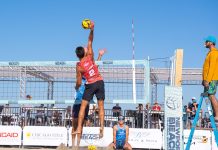Ahoy!
This week is a look back to the past, and let’s see what the major topics were in my columns from 10 years ago in the wake of 9/11. Immediately, recreational boating was affected, and San Diego was the most aggressive, with the Coast Guard and harbor police boarding and thoroughly inspecting every boat that entered the harbor. Additionally, a portion of San Diego harbor was closed to boating with increased off-limits zones around the Navy ships and no entry into the aircraft carrier basin.
Up the coast, Long Beach and Los Angeles harbors were under high port security, and boaters expected escorts and possible inspections. Seal Beach leading into Huntington Harbour was being randomly closed at times, and Newport Harbor was under increased surveillance, but boating was open. My sources told me at the time that the Navy was very, active and half the fleet had left the docks. Normally, about three quarters of the fleet is in port. Also, boaters had to be careful when transiting below Dana Point, as the Navy was conducting maneuvers off Camp Pendleton.
Ten years ago, I remember skippering yachts in the Pacific Ocean while off Camp Pendleton in the months following 9/11 and there were numerous warships on maneuver. I had many large blips on my radar, and I found it very interesting that most of the warships would turn and come within two miles of our vessel. IIn each time of encounter, our hand-held and mounted GPS receivers would glitch, which of course would cause the autopilot to fail and require all the units to be reset. Coincidence, or the Navy crew practicing electronic countermeasures on my vessel?
Another topic was the Newport Beach Christmas Boat Parade undergoing major changes by reducing the number of nights from seven to five, and beginning on the third Wednesday in December and concluding on the following Sunday. The parade was known to always occur from December 17 to the 23rd, and afterwards an on-the-water party with Singing Santa Jim Mahoney playing aboard a boat in the larger turning basis. Also, the shortening of the parade route, bypassing the channel between Lido Island and Lido Peninsula and across the bay at Peninsula point. These changes helped save the parade that was dwindling in popularity but now is one of Top 10 holiday events in the nation.
New on the table at the time was the proposed Nearshore Fishery Management Plan drafted by the state Department of Fish and Game. The plan had to be adopted by Jan. 1, 2002, as required by the Marine Life Management Act. Proposed were a series of alternatives for managing the fishery, such as harvest control, catch limits, regional management, protected areas and nearshore restricted areas. This plan was adopted and the regulations are restricting fishing whether commercial or recreational in many areas off our coast.
Yet, the plan never had the proper studies or data to support such extreme restrictions, and it appears the plan is excessive in restrictions as to where what species one can fish. A good thing that has gone too far?
Finally, California was ranked the second largest recreational boating state in America with Florida ranked in the No. 1 spot. California and Florida will always battle for first place just like Battle of the Bay between Newport Harbor High and Corona Del Mar high schools, and my alma mater triumphed last Friday. However I digress. Florida has the advantage over California with lower sales tax and no property tax on boats.
On another topic here is an excerpt from my Oct. 15, 2001 boating column, “When I was a kid, my parents always took us to Little Corona State Beach, and in those days you had to get there early for a parking spot that was not miles away. One observation that always stuck in my mind was that back in the ’60s, you had to jump over a noticeable, gross drainage stream coming from the canyon to the ocean. Finally, 30 years later, a diversion system is being installed to divert the runoff from the beach and better the water quality.” Buck Gully was finally being cleaned up, and I remember in the ’60s that there were these floating brown rocks in the water when we went swimming too.
Tip of the week is for boaters to not let their guard down to help protect us from terrorists. If you see something unusual then call your local Harbor pPatrol or Coast Guard, but do not use your VHF – use your cellphone or a landline.
And don’t forget: Tune in to the No. 1 boating radio talk show in the nation, Capt. Mike Whitehead’s Boathouse Radio Show, broadcasting coast-to-coast on the CRN Digital Talk Radio syndicated network every Saturday at noon, Pacific Time and replayed on Sunday at 10 am Pacific. Join Chandler Bell, Craig Carpenter, and me as we talk about “all things boating.” You can find the station listings, cable TV channels, live streaming on the Internet, and now available are apps to listen to the show for your iPhone, Blackberry, iTouch, Android, Palm, and Windows Mobile at www.BoathouseTV.com or www.BoathouseRadio.com.
Until next week, Safe Voyages!




